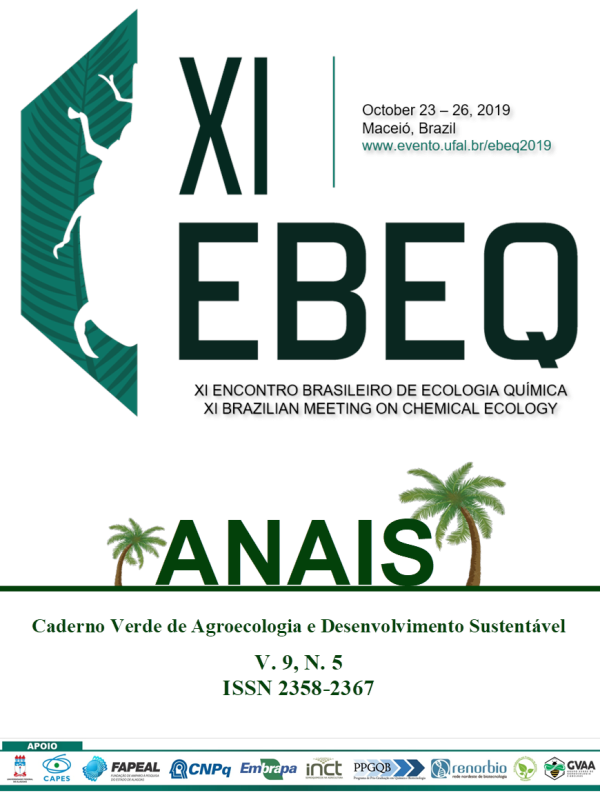THE INFLUENCE OF VOLATILE HOST FRUIT COMPOUNDS ON THE COMPOSITION OF THE C. capitata SEX PHEROMONE
Keywords:
MEDITERRANEAN FRUIT FLY, SEMIOCHEMICAL, SEX PHEROMONEAbstract
The fruit fly C. capitata is the most invasive among the species of economic importance due to its ability to grow in several host fruits, distributed around the world. In Brazil, the importance of this insect pest is related to its capacity to develop in fruits of economic importance. The mated females choose unripe or nearly ripe fruits to oviposit, then the larvae feed on the fruit pulp generating greater damage to fruit growers due to the unfeasibility of fresh fruits for market. The main methods used to control these insects are related to the application of pesticides in planted areas, which are harmful to the environment and humans. Thus, new selective methodologies aiming to reduce the population growth and the contamination risks should be developed and implemented in the Integrated Pest Management (IPM) of this inset. An alternative to the usual control practices is the use of volatile organic compounds (VOCs), which are released by virgin males in small quantities to attract conspecific males and females and is environmental friendly. Thus, the present study aimed to verify the role of larval diet on the pheromonal composition of sexually mature C. capitata virgin males. Additionally, the identification of the compounds most likely to serve as attractant to conspecific females, aiming copulation will be also determined. The chemical composition of the pheromonal mixtures were compared and the results revealed qualitative and quantitative differences, showing that it is influenced by the VOCs from host fruits, present in the host fruits offered as diet in the larval stage of these flies.Downloads
Published
How to Cite
Issue
Section
License
Termo de cessão de direitos autorias
Esta é uma revista de acesso livre, em que, utiliza o termo de cessão seguindo a lei nº 9.610/1998, que altera, atualiza e consolida a legislação sobre direitos autorais no Brasil.
O(s) autor(es) doravante designado(s) CEDENTE, por meio desta, publica a OBRA no Caderno Verde de Agroecologia e Desenvolvimento Sustentável, representada pelo Grupo Verde de Agroecologia e Abelhas (GVAA), estabelecida na Rua Vicente Alves da Silva, 101, Bairro Petrópolis, Cidade de Pombal, Paraíba, Brasil. Caixa Postal 54 CEP 58840-000 doravante designada CESSIONÁRIA, nas condições descritas a seguir:
O CEDENTE declara que é (são) autor(es) e titular(es) da propriedade dos direitos autorais da OBRA submetida.
O CEDENTE declara que a OBRA não infringe direitos autorais e/ou outros direitos de propriedade de terceiros, que a divulgação de imagens (caso as mesmas existam) foi autorizada e que assume integral responsabilidade moral e/ou patrimonial, pelo seu conteúdo, perante terceiros.
O CEDENTE mantêm os direitos autorais e concedem à revista o direito de divulgação da OBRA, com o trabalho simultaneamente licenciado sob a Licença Creative Commons do tipo atribuição CC-BY.
O CEDENTE têm autorização para distribuição não-exclusiva da versão do trabalho publicada nesta revista.
O CEDENTE têm permissão e são estimulados a publicar e distribuir seu trabalho online (ex.: em repositórios institucionais ou na sua página pessoal) a qualquer ponto antes ou durante o processo editorial, já que isso pode gerar alterações produtivas, bem como aumentar o impacto e a citação do trabalho publicado.








